We’re finally here. The end is in sight. Two teams, one dream. Japan versus Cuba for all the marbles. Did anyone see this coming? Could we have predicted that the final of the 1st World Baseball Classic would feature these two international rivals?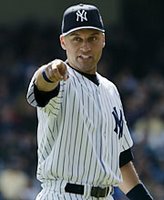 If I were a betting man, I would have put my money on a US vs. Dominican Republic final almost any day of the week. The United States roster featured players like 2-time AL MVP Alex Rodriguez and 4-time World Series Champion, Yankee captain, Derek Jeter. 1997 MVP Ken Griffey, Jr. manned centerfield, and 1999 NL MVP Chipper Jones had a bag full of bats with him, ready to slug his way to a title. The US had 7-time Cy Young Award winner, and 1986 MVP, Roger Clemens at the front of the pitching staff, and a host of Major League stars backing all of them up.
If I were a betting man, I would have put my money on a US vs. Dominican Republic final almost any day of the week. The United States roster featured players like 2-time AL MVP Alex Rodriguez and 4-time World Series Champion, Yankee captain, Derek Jeter. 1997 MVP Ken Griffey, Jr. manned centerfield, and 1999 NL MVP Chipper Jones had a bag full of bats with him, ready to slug his way to a title. The US had 7-time Cy Young Award winner, and 1986 MVP, Roger Clemens at the front of the pitching staff, and a host of Major League stars backing all of them up.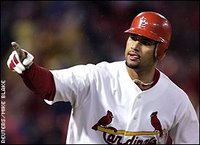 The Dominicans were equally loaded with MLB talent. Think about this group of players. 2002 AL MVP Miguel Tejada started at short, and 2005 NL MVP Albert Pujols took his position at first. 2005 AL MVP-runner up David Ortiz stepped in as DH, and 6-time All Star, 1997 World Series champion, Moises Alou was along for the ride. 2005 AL Cy Young winner Bartolo Colon headed the rotation, and a host of other Major League All Stars backed them up.
The Dominicans were equally loaded with MLB talent. Think about this group of players. 2002 AL MVP Miguel Tejada started at short, and 2005 NL MVP Albert Pujols took his position at first. 2005 AL MVP-runner up David Ortiz stepped in as DH, and 6-time All Star, 1997 World Series champion, Moises Alou was along for the ride. 2005 AL Cy Young winner Bartolo Colon headed the rotation, and a host of other Major League All Stars backed them up.
Boy, was I wrong.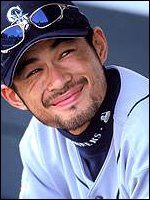 How is it that the Final of the WBC will feature a total of 2 Major League players, both on Team Japan? One of those players is the great future Hall of Famer, Ichiro Suzuki. The other is excellent relief pitcher Akinori Otsuka of the Texas Rangers. Of course, with the long-standing US embargo of Cuba, it takes serious effort to defect and enter the United States for a professional career. Undoubtedly, over the last generation we may have seen dozens of All Star caliber players in the Major Leagues, if not for the animosity that exists between Castro’s “Socialist Paradise” and the American Colossus dominating the region. Team Cuba has been the X-factor all along in this competition and they did not disappoint.
How is it that the Final of the WBC will feature a total of 2 Major League players, both on Team Japan? One of those players is the great future Hall of Famer, Ichiro Suzuki. The other is excellent relief pitcher Akinori Otsuka of the Texas Rangers. Of course, with the long-standing US embargo of Cuba, it takes serious effort to defect and enter the United States for a professional career. Undoubtedly, over the last generation we may have seen dozens of All Star caliber players in the Major Leagues, if not for the animosity that exists between Castro’s “Socialist Paradise” and the American Colossus dominating the region. Team Cuba has been the X-factor all along in this competition and they did not disappoint.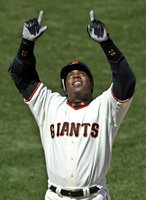 The fact remains. This result is a devastating blow to the credibility of Major League Baseball. With revelations of widespread doping in the American game, including some of the biggest stars of the last decade, and salaries often 20 times that of their competitors in the World Baseball Classic, is it wrong to wonder if Major League players are really as good as we’ve always believed? People here in Japan are asking that question this week, and more so tomorrow when we all gather again at work.
The fact remains. This result is a devastating blow to the credibility of Major League Baseball. With revelations of widespread doping in the American game, including some of the biggest stars of the last decade, and salaries often 20 times that of their competitors in the World Baseball Classic, is it wrong to wonder if Major League players are really as good as we’ve always believed? People here in Japan are asking that question this week, and more so tomorrow when we all gather again at work.
Regardless of what it means for the Major Leagues, none of us really should be too surprised at the matchup. I’ll tell you why. These teams regularly meet in the final rounds of baseball competitions all over the world. I went back and examined the key matchups of Japan and Cuba over the last 15 years and came up with an interesting list.
1991 A 10th inning single by catcher Jose Delgado lifts Cuba over Japan 5-4 in the championship game of the Intercontinental Cup (the WBC, before the WBC).
1992 Cuba wins the first ever Olympic Baseball gold medal, going 8-0. They beat Japan 8-2 on the 3rd day of the competition. Japan went on to win bronze.
1996 Cuba again breezes through the Olympic tournament 9-0, defeating Japan 8-7 in early round play and again 13-9 in the gold medal game.
1997 Japan stuns Cuba 11-2 in the final at the Intercontinental Cup, ending a 10 year domination of international competition for the Cubans, and breaking their string of 7 consecutive IC titles.
1999 Cuba is stunned in the 11th inning, 4-3, by host country Australia at the Intercontinental Cup, and settles for runner-up. Early in the tournament they beat Team Japan 4-1. Japan went on to defeat the US 6-0 in the 3rd Place game.
2000 Cuba beats Japan twice in Olympic early round games, 6-2 and 3-0, respectively. The US wins gold defeating Cuba 4-0, and Japan falls to Korea 3-1 in the bronze medal game.
2002 Cuba wins the International Cup on its home soil. They defeat Japan twice in early round play, 8-7 and 5-0. Korea fights hard, but goes down in the title game 2-1.
2004 Cuba wins gold in Athens, beating Australia 6-2. Japan claims bronze by beating Canada 11-2. On Day 3, Daisuke Matsuzaka deals a gem in defeating Cuba 6-3. Foreshadowing?
By my tally, Cuba has at least a 9-2 record against Japan in major international competition over the last 15 years.
The Baseball World Cup, which I know very little about, has been dominated by Cuba for nearly 70 years. They have claimed the title in 25 of the 36 competitions held, including the last 9 in a row, and 12 out of 13(Korea, 1982). It appears as though Japan and Cuba have not met during the last 3 Baseball World Cups, and beyond that I can't say.
What can we expect from this game at the Inaugural World Baseball Classic? I'm inclined to think that Cuba is too strong for Japan. I'm inclined to wonder what this game would look like with Hideki Matsui, Tadahito Iguchi, and Kenji Johjima involved. Alas, it was not meant to be. Japan will need to rely on the bat, legs, and strong throwing arm of Ichiro Suzuki. They will need to play their style of "small ball" almost to perfection. Any slight error will cost them dearly. The game is that tight.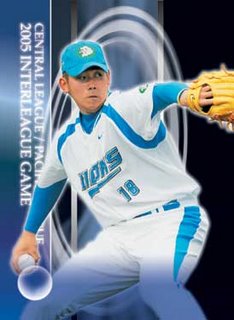 I've previewed a lot of Japanese players to this point. I'll give you the only player, other than Ichiro, that will determine the outcome of this game. That player is Daisuke Matsuzaka. Not only did he beat Cuba in the nations' only meeting at the Athens Olympics, but he may yet prove himself to be a strong Major League pitcher in the near future. I make no secret of my desire to see him in pinstripes ASAP.
I've previewed a lot of Japanese players to this point. I'll give you the only player, other than Ichiro, that will determine the outcome of this game. That player is Daisuke Matsuzaka. Not only did he beat Cuba in the nations' only meeting at the Athens Olympics, but he may yet prove himself to be a strong Major League pitcher in the near future. I make no secret of my desire to see him in pinstripes ASAP.
Matsuzaka is a horse, plain and simple. He throws pitches and he eats innings. He averaged 126 pitches a game for 28 games in 2005. Some say that he needs to slow down before his shoulder breaks apart, but he is the crown jewel of Japanese Professional Baseball and people are always talking about him. Matsuzaka was a high school phenom in Japan, and in one game he threw 249 pitches in 17 innings of play! He led his team to the championship in both the Spring and Summer editions of the Koshien National High School Baseball Invitational, which is like the NCAA Tournament of Japan. Matsuzaka pitched 10 innings in one Olympic game in Sydney 2000, as a recent high school graduate. Much of these details are documented by Will Carroll in this article highlighting his famous "gyroball". A more recent article claims that the gyroball isn't in Matsuzaka's arsenal, and that he hasn't used it at the WBC. Why don't you take a look for yourself and see. 
As the ace of the Seibu Lions staff, he led his team to the promised land in 2004, taking the Japan Series from the Chunichi Dragons 4 games to 3. Major League scouts have been watching him for years, and waiting. Will we have to wait much longer, especially if this dominating figure can achieve the impossible and hurl his way past Cuba to the WBC title?
The first thought on everyone's mind when speaking of Cuban baseball is, "Will anyone defect?" There are certainly some players that must be tempted to take their chances in North America, but the players all say that they play the game for love and not for money. We'll see what happens after the Championship Game. 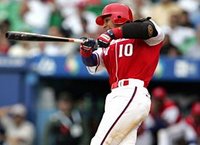 The guy that has everyone drooling is 21 year old Yulieski Gourriel. Many believe he could be as good as Alex Rodriguez and he has been a force for the Cubans in recent international competition, including these games. Gourriel is the son of legendary Cuban beisbol champion Lourdes Gourriel who has coached his son since he was born.
The guy that has everyone drooling is 21 year old Yulieski Gourriel. Many believe he could be as good as Alex Rodriguez and he has been a force for the Cubans in recent international competition, including these games. Gourriel is the son of legendary Cuban beisbol champion Lourdes Gourriel who has coached his son since he was born.
In the 2005 World Cup, Yulieski posted a 1.297 OPS with 8 home runs and 19 RBIs in 11 games.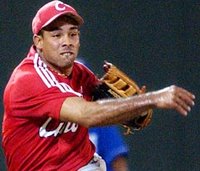 Team captain and leadoff man is shortstop Eduardo Paret. The 33 year old Paret provides veteran leadership to a team featuring so many wet-behind-the-ears ball players. In the 2005 Baseball World Cup, Paret led the team to it's 9th straight title with a 1.819 OPS, 7 walks and 12 hits in 26 plate appearances, and stole 8 bases in 6 games. He was named MVP.
Team captain and leadoff man is shortstop Eduardo Paret. The 33 year old Paret provides veteran leadership to a team featuring so many wet-behind-the-ears ball players. In the 2005 Baseball World Cup, Paret led the team to it's 9th straight title with a 1.819 OPS, 7 walks and 12 hits in 26 plate appearances, and stole 8 bases in 6 games. He was named MVP. The Cuban pitching staff has a number of quality arms. It's difficult to get a read on who will pitch in this game. All of their top pitchers can start and come out of the bullpen as we've seen several times in the WBC. Star hurlers Yadel Marti and Pedro Luis Lazo combined for the 3-1 victory over the Dominicans, and both have alternated between starting and finishing games. Their recent appearances will likely preclude them from playing in this contest much. I would expect the Cubans to turn to Ormari Romero for the start in this game, as he was sharp in defeating Puerto Rico on March 15th. 4+ days of rest should be enough to get him through the early part of the game, when he can turn things over to Vicyohandry Odelin or Yadiel Pedroso. The mystery is, either of those players could also get the start. It's that kind of team.
The Cuban pitching staff has a number of quality arms. It's difficult to get a read on who will pitch in this game. All of their top pitchers can start and come out of the bullpen as we've seen several times in the WBC. Star hurlers Yadel Marti and Pedro Luis Lazo combined for the 3-1 victory over the Dominicans, and both have alternated between starting and finishing games. Their recent appearances will likely preclude them from playing in this contest much. I would expect the Cubans to turn to Ormari Romero for the start in this game, as he was sharp in defeating Puerto Rico on March 15th. 4+ days of rest should be enough to get him through the early part of the game, when he can turn things over to Vicyohandry Odelin or Yadiel Pedroso. The mystery is, either of those players could also get the start. It's that kind of team.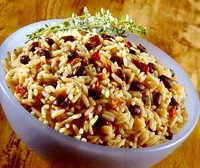 Now for the prediction. It seems clear to me that the Cuban team is superior in most respects. They have played together on the international stage for a long time, have championship experience, and play for the love of the sport. I like that. It's not to say that the Japanese team lacks passion or desire, and anytime you have a guy like Matsuzaka pitching you have a punchers chance, but Cuba has a lot to prove on US soil and I think it will propel them to yet another international baseball title. Ichiro and Matsuzaka will both impress and I think the game may be close, but Cuba will win out in the end. Cuba 5, Japan 3.
Now for the prediction. It seems clear to me that the Cuban team is superior in most respects. They have played together on the international stage for a long time, have championship experience, and play for the love of the sport. I like that. It's not to say that the Japanese team lacks passion or desire, and anytime you have a guy like Matsuzaka pitching you have a punchers chance, but Cuba has a lot to prove on US soil and I think it will propel them to yet another international baseball title. Ichiro and Matsuzaka will both impress and I think the game may be close, but Cuba will win out in the end. Cuba 5, Japan 3.
Sunday, March 19, 2006
Rice and Beans
Subscribe to:
Post Comments (Atom)

1 comment:
Hmmm. Cuba only getting one run is a bit hard to imagine. Even Rakuten was able to scratch out 11 runs against him in 3 games last season.
I'm cheering for Matsuzaka and Japan, but honestly I can't see how they can beat a team that features:
Yulieski Gourriel
Eduardo Paret
Yoandy Garlobo
Michel Enriquez
Osmani Urrutia
Plus all the pitchers are studs.
If Japan pulls it off, Koizumi should name March 21st a national holiday....oh....wait...it already is....
Post a Comment